Bio-Imperialism vs. Bio-Diversity
TRANSCEND MEMBERS, 13 May 2024
Prof. Vandana Shiva | Navdanya International – TRANSCEND Media Service
Global Context: Seeds and GMOs
15 Apr 2024 – Seeds are emblematic of the connections between our lives, our food, our health and our freedom. They are the first link in the food chain. They embody our heritage and enfold the future evolution of life. The cultivation of seeds and their free exchange among farmers is the core foundation of our biodiversity and our food security. To have control over seeds is to have control over our lives, our food and our freedom.
Bio-imperialism severely threatens this freedom today through intellectual property rights. Old and new GMO technologies that have transformed seeds from a commons shared by farmers, to a commodity under the control and monopoly of agribusiness corporations. This imperialism seeks to appropriate the world’s seeds, destroying the lives and livelihoods of peasant communities, as well as biodiversity, but more seriously, in territories recognized as centers of origin. These centers of origin of biodiversity are the cradles of the world’s food supply, and the protection against plague, climate challenges, natural disasters or other hindrances to food production.
Over the last few decades, GMO crops have been imposed in countries all over the world, advertised as a solution to food insecurity and the malnutrition crisis. However, hunger, disease and malnutrition have increased, while biodiversity has declined and toxins have spread. Corporations have forced the introduction of genetically manipulated seeds to impose Food Imperialism through various tools such as regulatory frameworks for intellectual property of seeds, such as UPOV 91, and other legal mechanisms like Trade Dispute Settlement Panels. GMO imperialism has destroyed the lives and livelihoods of small farmers and biodiversity around the world and especially in these centers of origin.
Most recently, agribusiness and biotech giants are attempting to bypass existing biosafety regulations, such as the Convention on Biological Diversity’s Cartagena and Nagoya Protocols by quietly making changes to GMO regulation around the world, in order to promote these new GMOs under new acronyms, such as NBTs (New Breeding Techniques), NGTs (New Genomic Techniques), or TEAs (Techniques of Assisted Evolution). These new GMOs have been silently dovetailing into different countries’ existing agricultural legislation, with the aim still being patent monopolies in the hands of the big chemical and biotechnology giants.
This deregulation would allow gene edited crops to:
- Be commercialized with no environmental or consumption safety testing
- Require no labeling
- Have little to no traceability
- Be free from public disclosure of gene edited organisms
- Mass deregulation
- Be patented without disclosure
These new GMOs are leaving farmers, and citizens completely in the dark as to what is in their food and are an attempt to subvert sovereign governments, the United Nations Convention on Biological Diversity and biosafety laws, with their imposition. The biotech industry has claimed that their gene edited products, including seed, plants, microorganism, and animals, are to be considered the same as their conventional counterparts. This deregulation of old and new GMOs absolves the biotech industry from any responsibility and is a continued attack on food sovereignty.
Agribusiness companies have not solved any issue for humanity on the pretext of false narratives around GMOs solving problems of food supplies. The true basis of the world’s food supply is free seeds, the heritage of humanity that contain the answers to pests, climate challenges and other threats to the world’s production of healthy and sufficient food, not GMOs and Bio-Imperialism. GMOs cannot be forced upon communities, violating norms of democracy and freedom.
All over the world, citizens are rising against the unscientific, undemocratic, anti-ecological imposition of GMOs by corporations. The first generation of GMOs has failed, but corporations continue to impose gene-edited organisms, or new GMOs, in centers of diversity. They continue to shift their narrative towards framing nature and biodiversity as commodities for commercialization and patent monopolies.
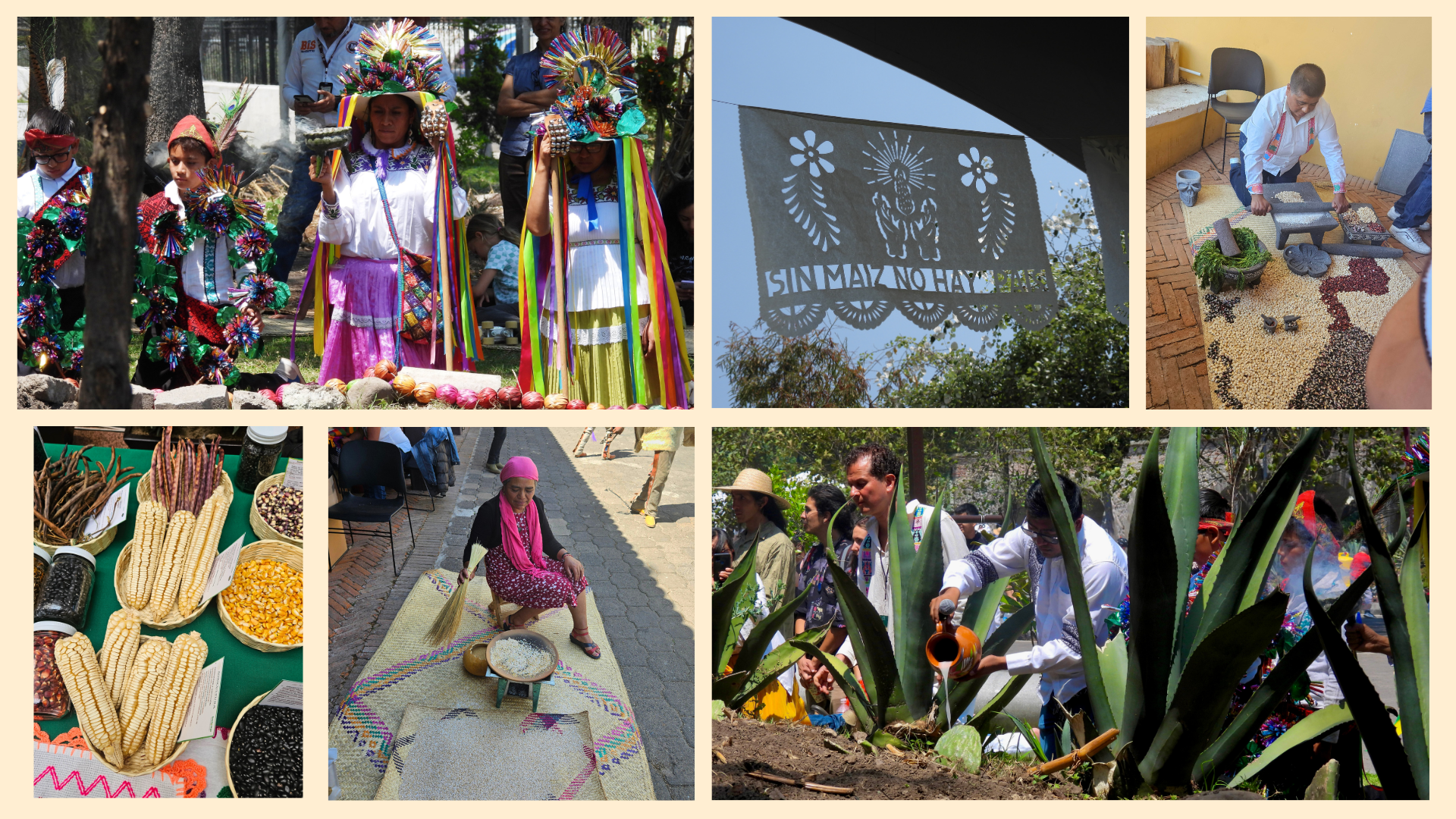
More photos here
Imposition of GM corn in Mexico has global ramifications
In Mexico, which is the center of origin of maize, just as in other centers of biodiversity, there has been a long struggle by society and organized communities against GMO imperialism threatening the subsistence and culture of its peoples. To date, Mexican society has achieved a ban on the planting of GM maize in Mexico through a class action lawsuit filed against the companies like Bayer-Monsanto, Syngenta and Cortiva Agriscience. This ban is still in force, which since 2013 has prevented the planting of genetically manipulated maize in Mexican territories.
Mexican NGOs have bravely continued to resist genetically modified maize to strengthen access to healthy, sustainable and culturally appropriate food for all people; to defend the food sovereignty of peasant and indigenous communities, responsible for developing the 59 breeds and thousands of varieties of maize existing in Mexico, which are also part of the milpa, a holistic, sustainable and biodiverse system that involves other staple foods such as beans, chili peppers, squash, quelites and amaranth.
Recently, the Mexican government issued an executive order that proposes the gradual prohibition of the use of glyphosate and the use of GM maize in food products, such as tortillas, a staple food for Mexicans. GMOs compromise access to healthy, sustainable, culturally appropriate foods free of genetically modified organisms. Faced with this decision, the U.S. government, based on the U.S.-Mexico-Canada Free Trade Agreement (USMCA), and under the duress, of agribusiness lobby, installed a dispute settlement panel to reject the Mexican government’s decision to restrict the use of genetically manipulated (modified) maize in human food and the importation of glyphosate, citing lack of scientific evidence of their harm. This Dispute Settlement Panel neglects the risks to human health, the environment and biodiversity associated with genetically manipulated maize. In addition, it jeopardizes the food sovereignty of the entire Mexican population, since maize is an indispensable food.
In response to this omission, on March 15th, non-governmental organizations from Mexico presented their Technical Opinions before the Panel, arguments based on reliable scientific evidence, including new found evidence by Mexico’s scientific advisory board CONAHCYT, rooted in scientifically rigorous evidence from academic institutions. This evidence points out and warns about the multiple risks that make it pertinent and urgent to stop the presence of genetically manipulated maize in the food of the Mexican population, and as raw material for other industries.
In stark contrast, the US refused to do new experiments and engage in real science and continued to stick to pseudo-science funded by the same agribusinesses that produce this GM corn and make the unscientific claim that it is safe to consume this GM corn.
The case of Mexico is a people’s attempt to guard their biodiverse cultures, inheritance, food, health and fields. It is a case of a people demanding their sovereignty be respected. It is a statement to the world and to agribusiness that they cannot continue to impose their system that violates and destroys sovereignty at all these levels, and has wave after wave destroyed health, the land and biodiversity.
On March 5, 2024 Mexico published its formal response to the dispute where its submission presented evidence supporting the implementation of precautionary measures aimed at safeguarding consumers from potential health risks associated with imported GM corn from the U.S. and residues of glyphosate. They noted that the scientific data regarding the safety of GMOs presented by the U.S. was outdated, with a significant portion originating from industry-sponsored studies lacking peer-reviewed support. They pointed out that the regulatory process in the U.S. lacks sufficient stringency to guarantee the safety of products for consumption by Mexicans. Furthermore, the Mexican submission highlighted that Genetically modified (GM) corn, designed to eliminate insect pests, has strong potential to pose negative effects on non-target animals with research that has demonstrated that mammals can experience harm to their digestive systems due to a GM trait that targets the guts of pests, leading to unintended consequences.
While the US claimed that Mexico’s ban is “unscientific”, IATP Senior Advisor Timothy A. Wise highlighted that Mexico’s response “refutes that claim, presenting hundreds of academic studies that show cause for concern about human health and the threat to native corn diversity.”
Significantly, The US claim that Mexico’s ban is unscientific is completely unjustified as the US never signed onto the Convention on Biological Diversity and the Cartagena Protocol on Biosafety. It has no biosafety regulatory organism to judge the safety of these GM foods. It is based instead on “substantial equivalence” which is not enough to be considered as a safety assessment in itself. This principle doesn’t prioritize consumer protection from health risks nor does it provide consumers with comprehensive information regarding the actual level of risks and hazards associated with “novel foods” (in this case GMO foods) compared to traditional ones.
In its formal submission to the trade dispute panel, Canada aligned itself with the arguments presented by the US government, claiming the safety of genetically modified (GM) corn for consumption in Mexico. However, CBAN’s (Canadian Biotechnology Action Network)’s response refuted this stance by asserting that scientific evidence supported Mexico’s precautionary measures, particularly due to the extensive use of minimally processed corn in the daily diet of the majority of Mexicans.
Lucy Sharratt of the Canadian Biotechnology Action Network (CBAN), stated that, “Mexico is a sovereign nation with the right to determine the future of its food supply and its needs to take action to protect native corn from GM contamination.”
Globally, Mexico’s case is important due to the current context of the world. Due to the industrial food system, we are seeing the rise of chronic diseases rooted in metabolic disorders, increasing ecological disasters, lack of water and declining biodiversity. Mexico defending its cultural and food heritage is equivalent to a country taking a stand, backed by scientific evidence and government support, against the continuation of these multiple crises.
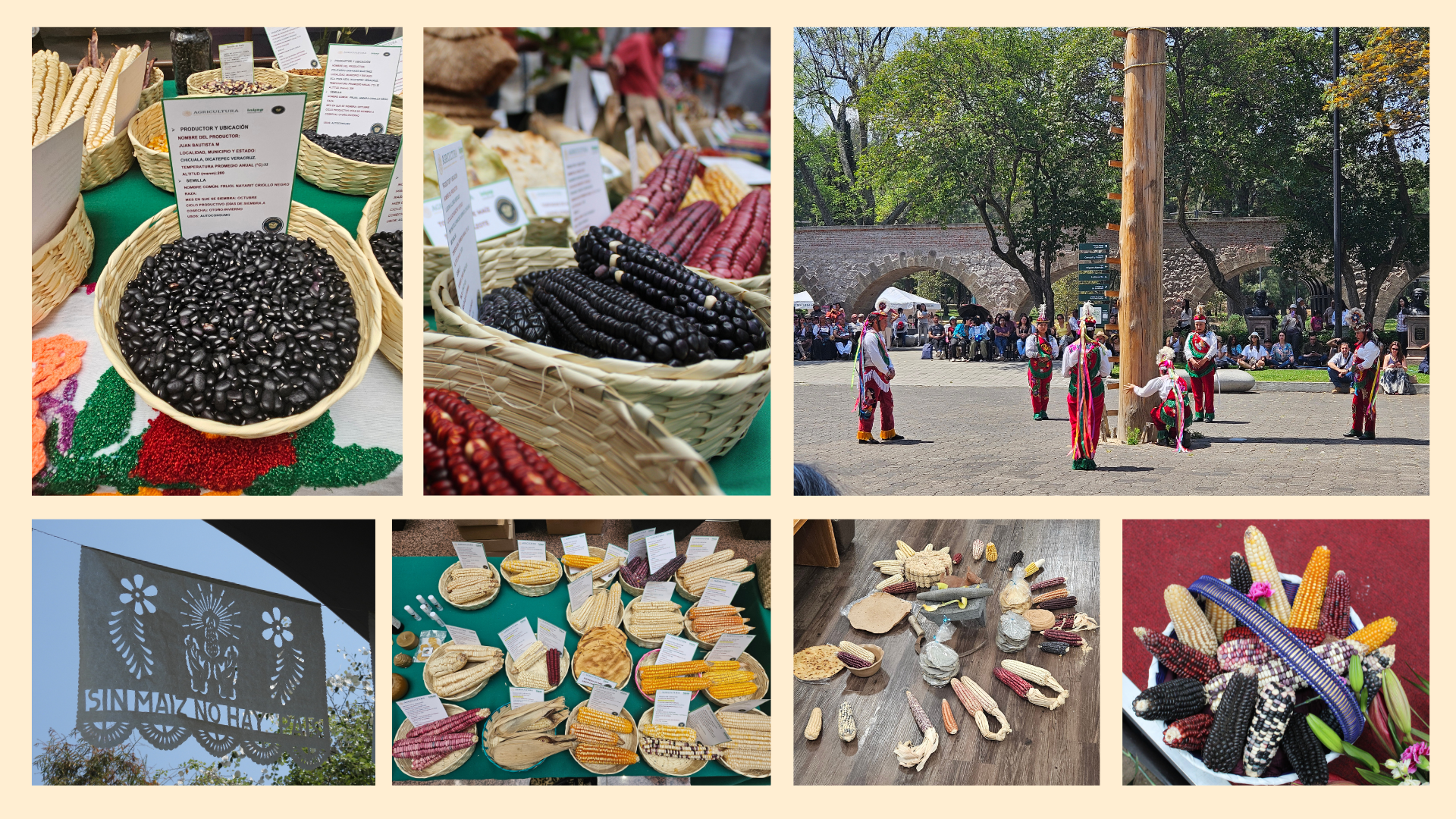
More photos here
Furthermore, the significance of this case is that an unfavorable resolution for Mexico in this Panel, would limit Mexican people’s right to decide which seeds to plant and which types of maize to feed themselves with. This directly jeopardizes the traditional Mexican cuisine which is central to the cultural identity of the communities that practice and transmit it from generation to generation and has been recognised as Intangible Cultural Heritage of Humanity by UNESCO.
This in turn also has the potential to devastatingly affect all other centers of biodiversity and interconnected food cultures around the world who will continue to face such attacks on their sovereignty.
Mexico holds the legacy of being one of the first constitutions globally to incorporate enforceable social rights, encompassing health and a clean environment (Article 4). Thus, a right to health is a legally enforceable provision under its national constitution. This along with achieving universal health coverage (UHC) for its 100 million citizens makes Mexico a country that continues to stand up for biodiversity, for health, for the environment.
Convergence: Interconnected strength, interconnected resistance
In the face of this local and global Bio-imperialism, Navdanya International joined together with the campaign Sin Maiz No Hay País, and Via Orgánica, along with the Ministry of the Environment and Natural Resources (SEMARNAT), the Ministry of Agriculture and Rural Development (SADER) and the Ministry of Culture, along with other Latin American movements to organize events from March 12th to 16th in Mexico City to carve a common strategy against the further imposition of new and old GMOs around the world, sharing experiences, struggles and solidarity in defense of Biodiversity, Food and Seed Freedom, through strengthening the support and solidarity, in cultivating and connecting different organizations, movements and people.
These meetings and convergences helped create a gathering place for solidarity by bringing together representatives from movements from all over Latin America and beyond to demonstrate that this struggle goes beyond individual borders. All over the world the impostions continue to take place, directly violating the sovereignty and rights of people and nature, in favor of corporate agenda.
José Bernardo Magdaleno Velazco (Nino), President of the Peasant Union, Totikes, Chiapas emphasized that “we are not alone in this fight”. Together with activists and organizations such as the Campaña Nacional Sin Maíz No Hay País, Semillas de Vida, Vía Organica, Regeneration International, Bloque Verde, Probioma, Naturaleza De Derechos, and Semillas de Identidad- Colombia, Navdanya International joined the demand for governments around the world to stop genetically manipulated seeds, which threaten the survival of food and agricultural systems based on biological and cultural diversity.
These events carved a convergence of movements, to stand in defense of our biocultural diversity and food heritage across the world, in resistance to old GMOs and new GMOs.
It is in this coming together of different movements and voices united in their goal of food and seed sovereignty that these events in Mexico led to the emergence of an interconnected strength and resistance. Where the nurturing of solidarity and a reminder of a common resistance despite varied contexts, echoed and re-iterated that together, we are all more than the sum of the parts. Building relationships and connections, across organizations, across movements and beyond countries is necessary for effectively resisting this GMO imperialism. This interconnected strength is what we have to tap into, to continue our struggle in defense of life, diversity and freedom.
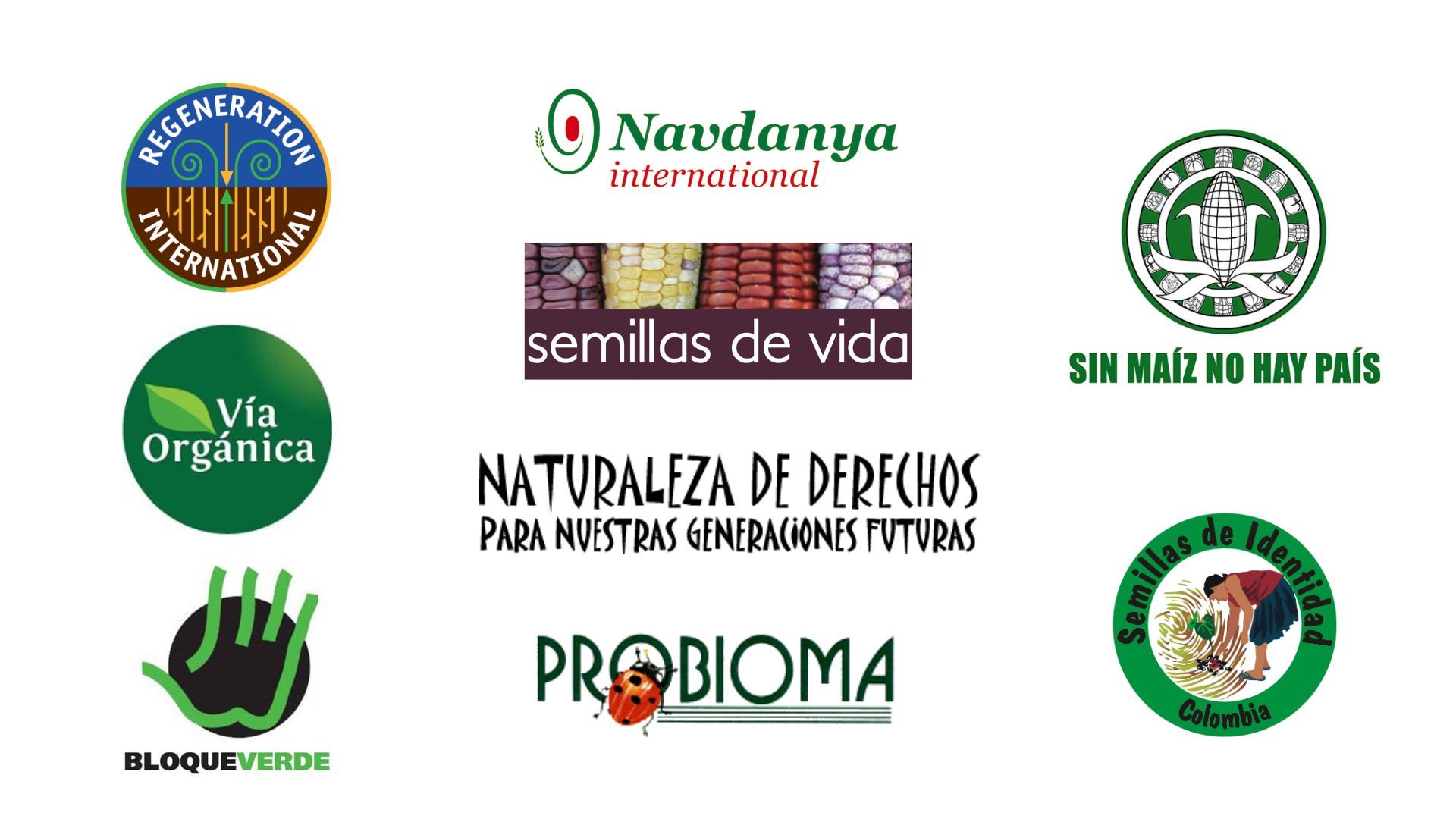
Significance: Food sovereignty as a driving force for political sovereignty
The current socio-political context of Mexico’s demand of autonomy based on being a center of diversity and cultural heritage is unique because food sovereignty is the driving force behind the political sovereignty of the people. This reiterates that every kind of autonomy is rooted in food and seed.
At the event held on March 12, 2024 at Mexican Ministry of Agriculture and Rural Development (SADER), Mexico City called “In Defense of Food Sovereignty”, Dr. Vandana Shiva, President of Navdanya International in her keynote lecture on food sovereignty, mentioned that it was so important to celebrate cultures where cultural diversity and biodiversity are not seen as separate. She added that “Food sovereignty is a high level concept, because it implies the sovereignty of beings to manage and organize themselves toward health.” The cultivation of biodiversity has to imply sovereignty at all levels. Sovereignty is needed at all levels for organisms to be able to freely develop and evolve, self organize toward health.
Leydy Pech, evocatively added in the same event that “In Maya, we have no word for GMO, we call them instead seeds that have no heart, seeds with no life.” Furthermore, she asked a significant question, potent for everyone around the world: “Our seeds, our knowledge is our inheritance, with this destruction what will we inherit in the future?”
As also highlighted by Jesús Ramírez Cuevas, general coordinator of social communication and spokesperson for the Government of the Mexican Republic, “Mexican sovereignty starts with food sovereignty.” It is food sovereignty and the sovereignty of all interconnected beings to self-organize and grow with health that holds the power of resistance politically, economically and socially.
GMO imperialism is an attack on this sovereignty of all interconnected beings at all levels of self organization. It is an attack on life itself.
As Leydy Pech echoed: “You cannot call what goes against life, development”. Dr. María Elena Álvarez-Buylla Roces, general director of the National Council of humanities, sciences and technologies (CONAHCYT) said that “On a global level the deregulation and imposition of GMOs and toxic food systems is a denial of sovereignty and right to health on multiple levels.” She added that Mexico’s success in asserting its own sovereignty on seeds and food policies would be a beacon for other countries to be able to assert their food sovereignty and seed freedom in turn.
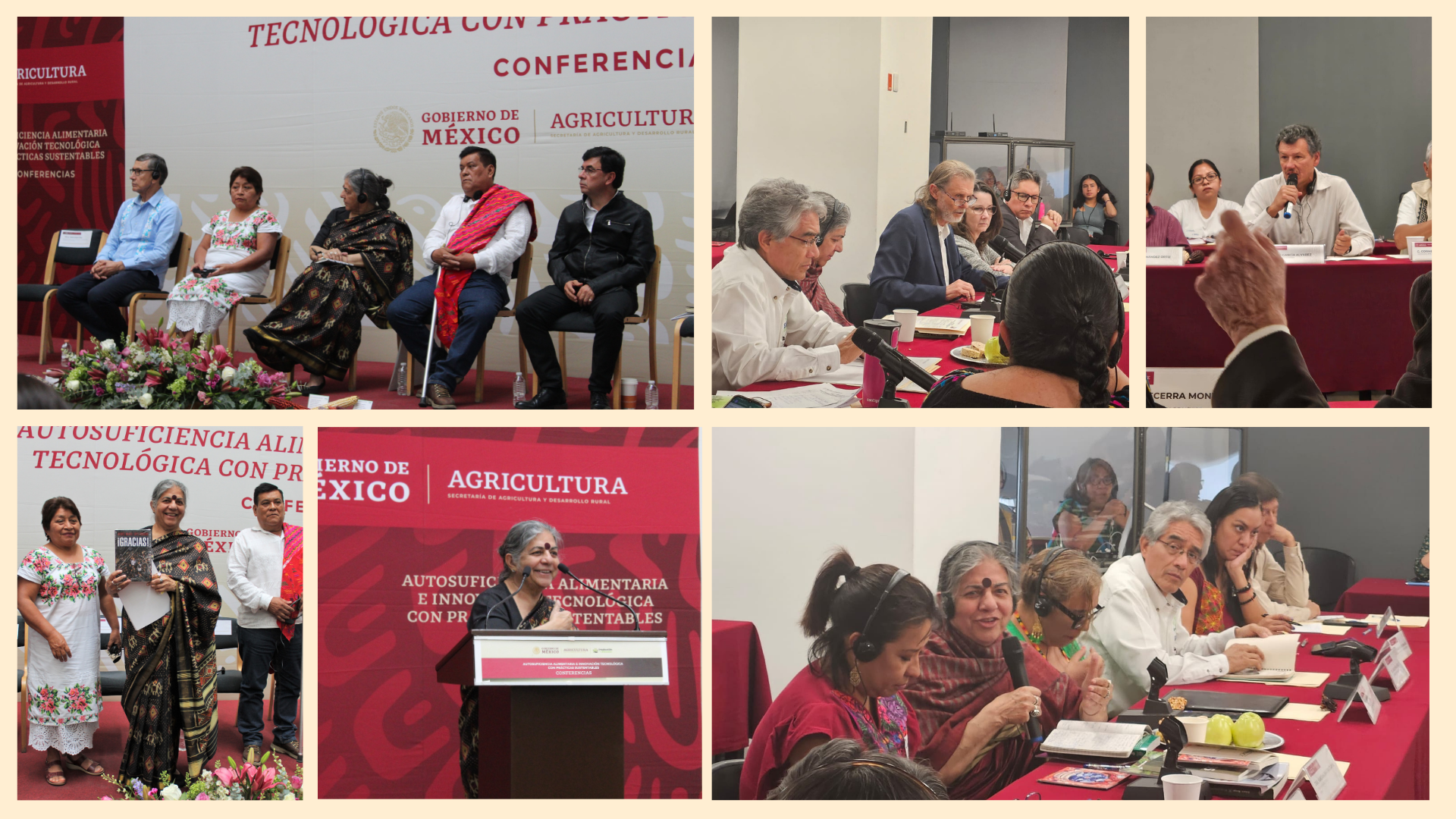
More photos here
Biodiversity at all levels
A Seminar on Biodiversity Protection titled “Protection and Conservation of Biodiversity in Centers of Origin” was held on March 15, 2024 at the Mexican Ministry of Environment and Natural Resources (SEMARNAT) Headquarters, Mexico City. This seminar analyzed and discussed strategies to conserve and protect natural resources in countries that are centers of origin and genetic diversity of species, through a dialogues, work round tables, and discussions for common strategy with key actors of the Mexican government, representatives from Latin America, Asia, the United States, and others in the protection and conservation of biodiversity in Latin America and other regions.
Maestro Iván Rico López, Subsecretary of Environmental Planning and Policy, SEMARNAT highlighted that “Megadiverse countries, the centers of origin of crop varieties, have greater responsibility in protecting the world’s biodiversity. We have learned that our plant genetic heritage is our cultural heritage. Natural and Social aspects go hand in hand, as those who have preserved the genetic diversity are the indigenous peoples.”
Columba López, Director of the Commission for Natural Resources and Rural Development, CORENADR, emphasized the key to this biodiversity being in the hands of the farmers. It is the farmers who are the custodians of these biodiverse foods, cultures, seeds, knowledges. She said that “We work on native seeds in our Seed Houses. We cultivate and replicate seeds through agroecological practices in the field. We develop seeds that adapt in the mountains or near the water, that are climate resilient and we do it through farmers’ participatory breeding.”
Biodiversity at all levels produces health, diversity in our farms, our seed, our foods, our cultures etc. having a biodiverse field in line with local ecosystem and cultural heritage, gives us a diversity of foods, and a diversity of food cultures. This is how we create health first in our fields all the way to our plates and our guts.
Dr. Vandana Shiva, of Navdanya International highlighted that, “Indigenous peoples and communities know that seeds continuously evolve. By turning biodiversity into technology they (corporations) deny the creativity of biodiversity, they go against how nature works. Diversity is a living necessity.” She further reiterated that, “The colonizing mentality considers living beings as disposable and nature as raw material to be extracted. Mexico is recovering the dignity of natural resources, which are the basis of our health and well-being & the health of the planet.”
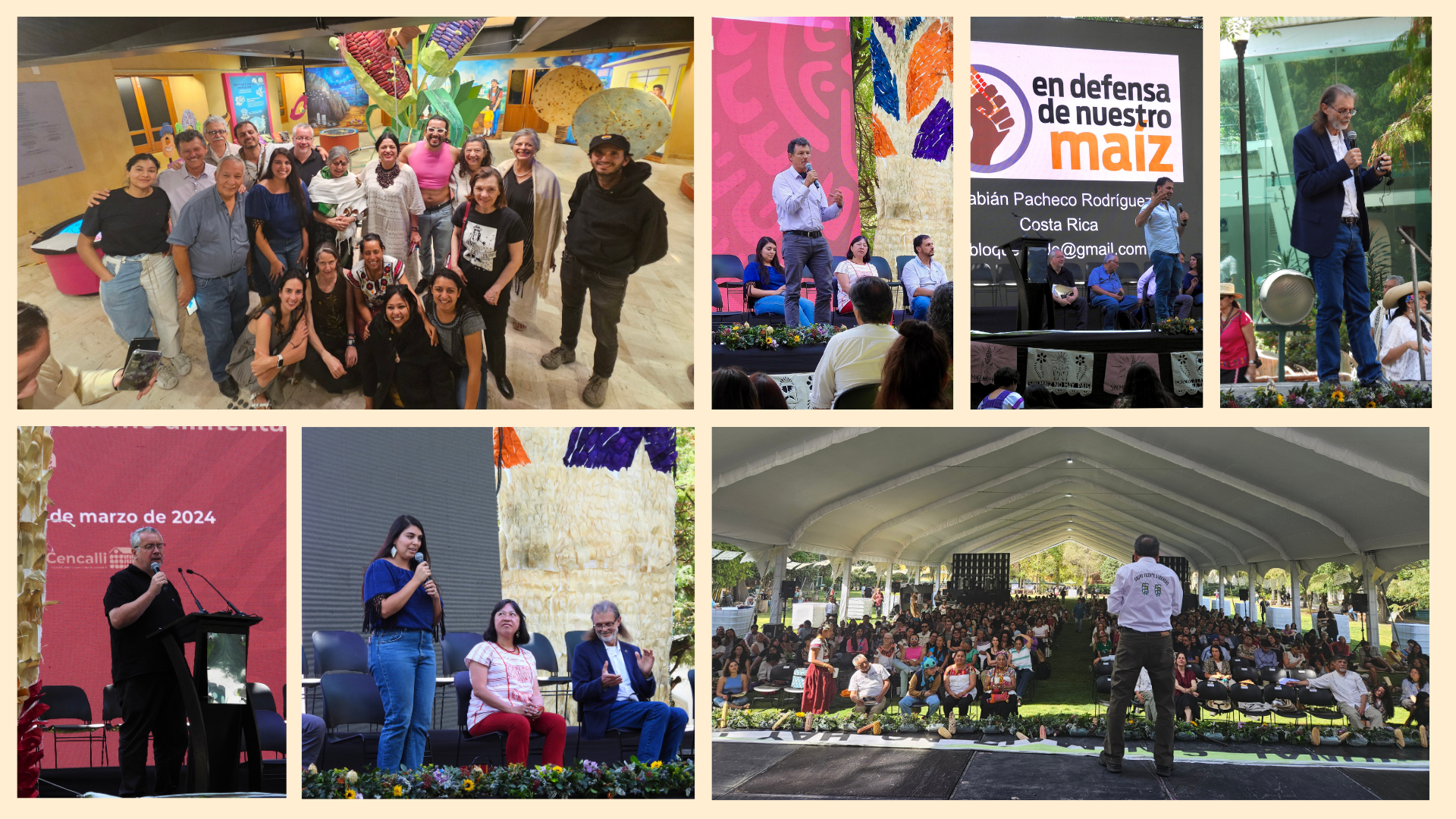
More photos here
Similarly, at the event held on March 16, 2024 held at Cencalli, Museo de maíz y centro de la cultura alimentaria, Los Pinos, Ciudad de México, in the presence of the Alejandra Frausto Guerrero, from the Ministry of Culture, Dr Vandana Shiva reaffirmed the need to resist the food imperialism that destroys our cultures by defending our biodiversity and strengthening seed freedom. Navdanya International co-organized this event with Campaña Nacional Sin Maíz No Hay País, Via Organica and Regeneration International. Andre Leu, Director of Regeneration International, discussed the latest evidence of negative health effects caused by exposure to glyphosate: “There’s scientific evidence about the correlations between the introduction of glyphosate and transgenic crops and the increase in diseases such as cancer, obesity, kidney failure and autism.”
Mercedes López Martínez from Vía Orgánica, Mexico, discussed the great importance of protecting small farmers and indigenous communities as the backbone of a thriving food culture. Miguel Ángel Crespo of Probioma, Bolivia shared how, “The fight to protect biodiversity and genetic resources is also political, legal and scientific.”
It is this interconnection of diversity at all levels, including diversity of organizations and movements reflecting the interconnection and sovereignty of organisms that is needed to resist GMO imperialism from the ground up.
_______________________________________________
Photo credits: Valeria Campos
 TRANSCEND Member Prof. Vandana Shiva is a physicist, ecofeminist, philosopher, activist, and author of more than 20 books and 500 papers. She is the founder of the Research Foundation for Science, Technology and Ecology, and has campaigned for biodiversity, conservation and farmers’ rights, winning the Right Livelihood Award [Alternative Nobel Prize] in 1993. She is executive director of the Navdanya Trust.
TRANSCEND Member Prof. Vandana Shiva is a physicist, ecofeminist, philosopher, activist, and author of more than 20 books and 500 papers. She is the founder of the Research Foundation for Science, Technology and Ecology, and has campaigned for biodiversity, conservation and farmers’ rights, winning the Right Livelihood Award [Alternative Nobel Prize] in 1993. She is executive director of the Navdanya Trust.
 Navdanya and the Navdanya movement were created by Dr. Vandana Shiva 30 years ago in India to defend Seed and Food sovereignty and small farmers around the world. Navdanya pioneered the movement of seed saving and seed freedom, which began in response to the crisis of erosion of agricultural biodiversity and introduction of GMOs and patents on seeds through intellectual property rights (IPRs) and so-called ‘free trade’ agreements. It has long fought against biopiracy, the patenting of indigenous knowledge by self-interested multinational corporations and won cases related to Neem, basmati rice and wheat in India. Navdanya promotes a new agricultural and economic paradigm, a culture of food for health, where ecological responsibility and economic justice replace the present greed, consumerism and competition which have become dominant in society. It aims at regaining the common good as a foundation for a renewed sense of community, solidarity and culture of peace. We strive to achieve these goals through the conservation, renewal and rejuvenation of the gifts of biodiversity we have received from nature and our ancestors, and to defend these gifts as commons. info@navdanyainternational.org – More…
Navdanya and the Navdanya movement were created by Dr. Vandana Shiva 30 years ago in India to defend Seed and Food sovereignty and small farmers around the world. Navdanya pioneered the movement of seed saving and seed freedom, which began in response to the crisis of erosion of agricultural biodiversity and introduction of GMOs and patents on seeds through intellectual property rights (IPRs) and so-called ‘free trade’ agreements. It has long fought against biopiracy, the patenting of indigenous knowledge by self-interested multinational corporations and won cases related to Neem, basmati rice and wheat in India. Navdanya promotes a new agricultural and economic paradigm, a culture of food for health, where ecological responsibility and economic justice replace the present greed, consumerism and competition which have become dominant in society. It aims at regaining the common good as a foundation for a renewed sense of community, solidarity and culture of peace. We strive to achieve these goals through the conservation, renewal and rejuvenation of the gifts of biodiversity we have received from nature and our ancestors, and to defend these gifts as commons. info@navdanyainternational.org – More…
Also read:
- Vandana Shiva makes an International call to support Mexico in the defense of Seed Freedom and Biodiversity
- Events in Mexico: Resisting GMO Imperialism
- Joint Declaration in Defense of our Biodiversity, Seed and Food Freedom – Resisting GMO Imperialism
- Open Letter from Diverse Women for Diversity to World Leaders
- US pressure to impose GM corn in Mexico threatens global genetic heritage of Maize Diversity
Go to Original – navdanyainternational.org
Tags: Agri-food, Biodiversity, Imperialism, Navdanya International, Organic food, Right to Food, Seeds, Vandana Shiva
DISCLAIMER: The statements, views and opinions expressed in pieces republished here are solely those of the authors and do not necessarily represent those of TMS. In accordance with title 17 U.S.C. section 107, this material is distributed without profit to those who have expressed a prior interest in receiving the included information for research and educational purposes. TMS has no affiliation whatsoever with the originator of this article nor is TMS endorsed or sponsored by the originator. “GO TO ORIGINAL” links are provided as a convenience to our readers and allow for verification of authenticity. However, as originating pages are often updated by their originating host sites, the versions posted may not match the versions our readers view when clicking the “GO TO ORIGINAL” links. This site contains copyrighted material the use of which has not always been specifically authorized by the copyright owner. We are making such material available in our efforts to advance understanding of environmental, political, human rights, economic, democracy, scientific, and social justice issues, etc. We believe this constitutes a ‘fair use’ of any such copyrighted material as provided for in section 107 of the US Copyright Law. In accordance with Title 17 U.S.C. Section 107, the material on this site is distributed without profit to those who have expressed a prior interest in receiving the included information for research and educational purposes. For more information go to: http://www.law.cornell.edu/uscode/17/107.shtml. If you wish to use copyrighted material from this site for purposes of your own that go beyond ‘fair use’, you must obtain permission from the copyright owner.
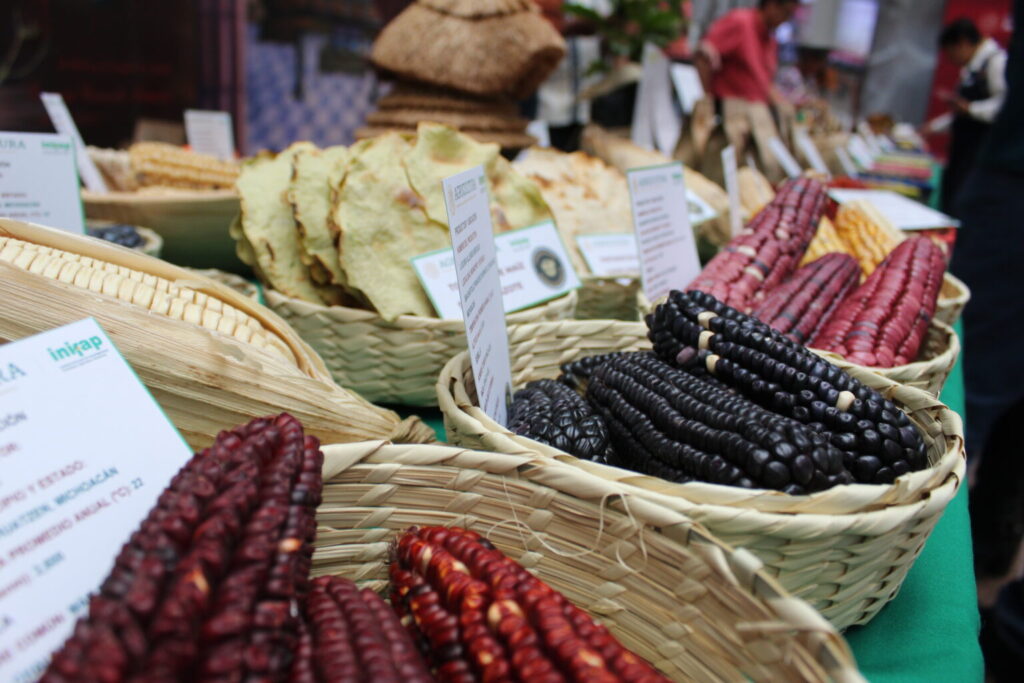
Thank God for Vandana Shiva!